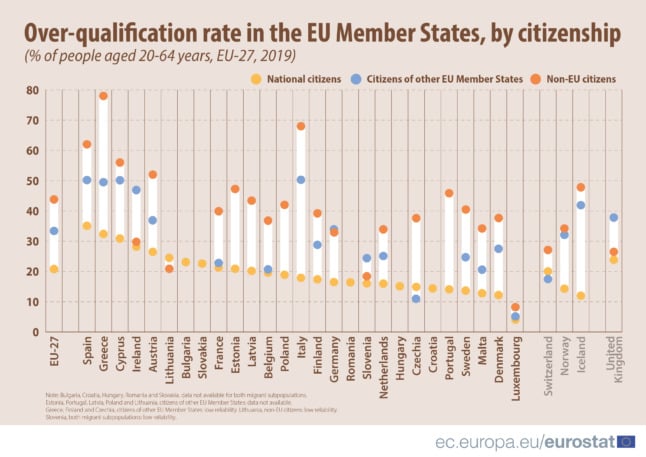It’s a well known fact that Spain isn’t the destination of choice for most foreigners who want to further their careers.
For tens of thousands of Spaniards every year, it’s also the country they have to leave if they want to move up the career ladder or get their foot in the door.
Seventy-six percent of Spain’s work market is made up of service-based jobs mainly in tourism, hospitality and sales, all of which are professions that do not necessarily require a university qualification.
But 9.08 million of the 19.7 million people who currently work in Spain have a higher education qualification, the latest figures published in Spain’s Working Population Survey (EPA) in July report, reflecting how around 46 percent of Spain’s workforce is forced to accept a job that’s not in their field and probably not meeting their salary expectations.
Spain is one of the countries in the EU with most university graduates but it’s on top of the leaderboard when it comes to wasted talent.
According to Eurostat data from January 2021, 37 percent of Spain’s workforce is overqualified, 17 percent more than the EU average.
Since 2011, it’s had the highest overqualification rates among workers in the bloc, which highlights how Spain’s economy has long been focused on tourism and services, with no clear change in sight. And the figures suggest the balance has been worsening over the last decade.
Foreigners in Spain are among those who end up in a job they’re overqualified for most often.
Among EU migrants in Spain, around half of those working are overqualified, but when it comes to non-EU workers the trend is even more pronounced: two in every three are doing jobs they haven’t studied and trained for.

Eurostat data showing overqualification rates in the EU across the EU for Spanish nationals, EU citizens and non-EU citizens.
READ ALSO:
- The downsides of moving to Spain for work
- Not just English teaching: The jobs you can do in Spain without speaking Spanish
One of the problems behind this alarming situation for third country nationals is the two-year wait for qualifications to be recognised by Spain’s Ministry of Education, essential in particular for people in regulated professions such as medicine, nursing, dentistry, law and more.
Tens of thousands of workers who could offer their expert skills to Spain, in particular health workers during this ongoing pandemic, are being held back by painstaking and outdated bureaucratic practices that force them to choose any job just to make ends meet.
Having a qualification means less than ever in Spain, but the latest data by EPA reflects how the country has 500,000 more workers with higher qualifications than in 2020.
For foreigners in Spain faced with these dire work prospects, it’s often a case of weighing up the pros of a country with a high quality of life and accepting the cons of a limited job market, setting up their own businesses or having their main source of income abroad.
READ ALSO:



 Please whitelist us to continue reading.
Please whitelist us to continue reading.
Member comments